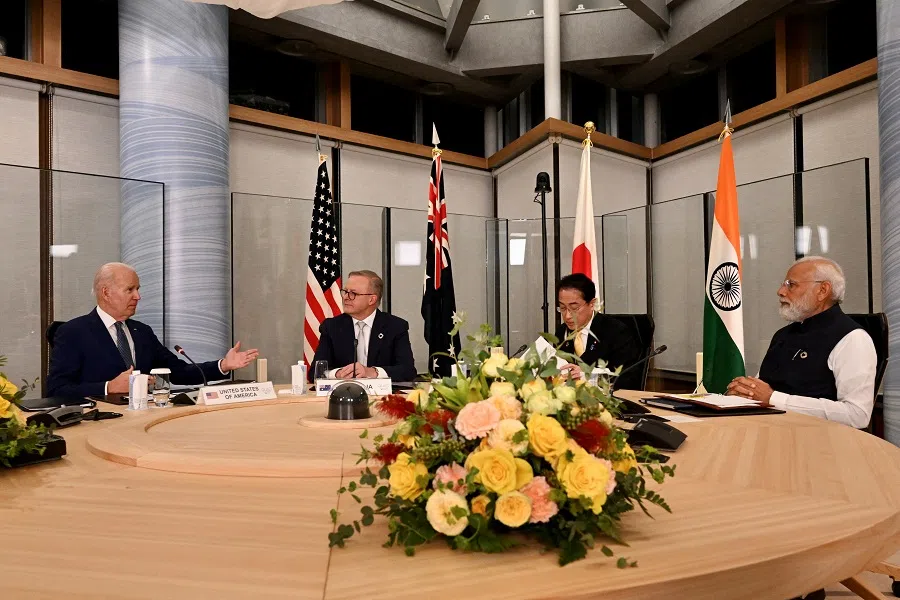Bangladesh's Indo-Pacific Outlook: Another anti-China vision?
Researcher Rishi Gupta analyses Bangladesh's recently released Indo-Pacific Outlook, noting that while it does not state where Bangladesh stands vis-à-vis China and the West, some of the stated goals coincide with the Quad's interests in upholding a rules-based system, thwarting Chinese aggressiveness, advancing connectivity projects and tackling Indo-Pacific security issues.

In April this year, Bangladesh released its Indo-Pacific Outlook - a 15-point vision containing merely 660 words - joining a group of countries who have officially envisioned a strategic outlook for the Indo-Pacific region, including the US, Japan, India, Australia and Canada. Bangladesh's critical location at the intersection of South Asia and Southeast Asia and its coastline running through the Indian Ocean rim sees its Indo-Pacific Outlook defying the notion that small states tend to limit themselves in a competitive geostrategic environment.
Despite being one of the world's most densely populated countries with widespread poverty, Bangladesh continues to achieve wonders in terms of economic growth. Bangladesh's per capita GDP is US$2,688, outstripping India's US$2,389. Its economic growth success lies in its location along the Bay of Bengal, a region that continues to be a site of intense contest between China on the one hand and the US, India, Japan and Australia on the other.
With a rising economic base, the Indo-Pacific region holds immense trade and business prospects for Bangladesh, including enormous potential for boosting its export market, attracting foreign investment and participating in regional supply chains. This is thanks to the fast-growing economies of India, China, Japan, South Korea and the ASEAN countries in its neighbourhood.

Bangladesh understands the enormous contribution of the Indo-Pacific region to global GDP, global trade, climate action and technological dynamism, which are crucial components of long-term resilience and prosperity. By launching its Indo-Pacific Outlook, Dhaka has echoed the economic importance of the Indo-Pacific region, emphasised by the US in its own Indo-Pacific Economic Framework: "With 60 percent of the world's population, the Indo-Pacific is projected to be the largest contributor to global growth over the next 30 years."
Bangladesh's approach to the Indo-Pacific is based on the values of international law compliance, goodwill towards everyone and respect for country sovereignty...
Bangladesh's Indo-Pacific Outlook affirms its stake in the community
As stated in its Indo-Pacific Outlook, Bangladesh envisions the Indo-Pacific region's security and prosperity as essential to its long-term objectives of being a modern, prosperous nation by 2041. It identifies that "the Indo-Pacific area's collective share in global GDP, preponderance in international trade, enhanced climate action and growing technological dynamism can be key determinants for ensuring Bangladesh's long-term resilience and prosperity".
As a result, of the immense economic potential of the Indo-Pacific region, "Bangladesh, therefore, envisions a free, open, peaceful, secure, and inclusive Indo-Pacific for the shared prosperity for all". Bangladesh's approach to the Indo-Pacific is based on the values of international law compliance, goodwill towards everyone and respect for country sovereignty - an element that was the foundation of the birth of Bangladesh in 1971. The Outlook is guided by the philosophy of Bangladesh's founding father, Sheikh Mujibur Rahman - "friendship to all, malice to none".
The 15 core objectives set out in Bangladesh's Indo-Pacific Outlook include fostering partnerships, collaboration and mutual trust for the region's peace, prosperity and security. Bangladesh wants to support the Indo-Pacific region's efforts in non-proliferation, peacekeeping, maritime safety and security, freedom of navigation, and counterterrorism. Additionally, Bangladesh intends to fight transnational organised crime and advance women's safety and peace, religious harmony and an inclusive society.
Bangladesh emphasises collaboration in research, innovation, science, and technology for mutual gain - an approach that has hardly been thought through by the geographically smaller countries in South Asia.

The Indo-Pacific Outlook of Bangladesh also promotes an open, transparent, rules-based order for connectivity, technology transfer, equitable and sustainable development, and responsible behaviour in cyberspace and space - all factors that are critical to the management of its economy, sensitive data and digital infrastructure.
Additionally, Bangladesh aims to use its strengths in agriculture, manufacturing and services to create resilient regional and international value chains, support the preservation and responsible use of marine resources, address climate change and environmental issues, ensure energy security through renewable energy, and improve regional cooperation through partnerships with sub-regional nations and pertinent organisations.
Notably, Bangladesh emphasises collaboration in research, innovation, science, and technology for mutual gain - an approach that has hardly been thought through by the geographically smaller countries in South Asia.
... some of its goals coincide with the Quad's interests in upholding a rules-based system, thwarting Chinese aggressiveness, advancing connectivity projects and tackling Indo-Pacific security issues.
The China factor
Bangladesh's Indo-Pacific Outlook does not overtly support either side in the geostrategic conflict between China and the Quad countries. But some of its goals coincide with the Quad's interests in upholding a rules-based system, thwarting Chinese aggressiveness, advancing connectivity projects and tackling Indo-Pacific security issues. The Outlook indeed emphasises how to strike a balance between preserving regional stability by "collaboration with sub-regional partners and relevant organisations towards bolstering regional cooperation and enhancing mutually beneficial complementarities".
... Bangladesh seeks to expand its connectivity choices by cooperating with other nations in the Indo-Pacific area - something that may not fit well into China's grand strategy.

Bangladesh's Indo-Pacific Outlook is critical to Dhaka's ties with Beijing as it emphasises maintaining friendly relations with all while upholding its national interests and sovereignty. Today, China is its biggest trade partner, with total exports to China amounting to US$45.141 million in January 2023.
Meanwhile, although China plays a vital role in Bangladesh's infrastructure development, the Indo-Pacific Outlook states that Bangladesh seeks to expand its connectivity choices by cooperating with other nations in the Indo-Pacific area - something that may not fit well into China's grand strategy.
All in all, it is a well-balanced Indo-Pacific Outlook as it offers a framework for interacting with other regional players, such as China, based on respect, collaboration, and shared prosperity. Bangladesh seeks to manage its ties with China and other regional powers to maximise its resilience and prosperity over the long term and contribute to the stability and growth of the region.
... it falls short of a vision of the Indo-Pacific's changing security environment, given the rise in territorial disputes, military activity and the possibility of confrontations in the region.
What is missing from the Indo-Pacific Outlook?
Despite its promising value, Bangladesh's Indo-Pacific Outlook does not mention the geopolitical rivalry and power relationships among the region's leading players, including China, the US, and India, and opts for a hedging approach. On the security front, the Outlook briefly emphasises the significance of maritime security. However, it falls short of a vision of the Indo-Pacific's changing security environment, given the rise in territorial disputes, military activity and the possibility of confrontations in the region.

At the same time, the Indo-Pacific region's economic competitiveness and trade dynamics are not sufficiently covered, which is a crucial component of the ongoing geostrategic competition, especially in fields like commerce and technology. Bangladesh could also specify strategies for participation and collaboration with critical Indo-Pacific institutions and alliances; instead, Dhaka keeps it vague.
Also, the Outlook makes a passing reference to responsible conduct in open and secure cyberspace, but it does not offer a thorough strategy for dealing with the shifting issues of cybersecurity and technological competitiveness. Bangladesh must prioritise cybersecurity and technology resilience in an era of expanding digital connections and technological developments.
How did the US, India and China react?
The global response to Bangladesh's Indo-Pacific Outlook has been varied. The US finds Bangladesh's Indo-Pacific Outlook complementary to its Indo-Pacific Strategy. The Outlook has also been lauded by India's external affairs minister, S Jaishankar, for showing adherence to international agreements, norms and beliefs. China, too "noted" the release of the Bangladesh Indo-Pacific Outlook and "believes that many of its ideas are similar to those of China". Surprisingly, "China supports Bangladesh in playing a more active and more significant role in regional and international affairs while preserving its foreign policy of Independence".
These major responses indicate a diplomatic success for Dhaka in striking a delicate balance between China and the US-led alliance in the Indo-Pacific region. And despite several misses, the Indo-Pacific Outlook of Bangladesh demonstrates a nuanced and practical foreign policy strategy that aims to maintain its strategic autonomy while considering regional power dynamics.



![[Big read] When the Arctic opens, what happens to Singapore?](https://cassette.sphdigital.com.sg/image/thinkchina/da65edebca34645c711c55e83e9877109b3c53847ebb1305573974651df1d13a)

